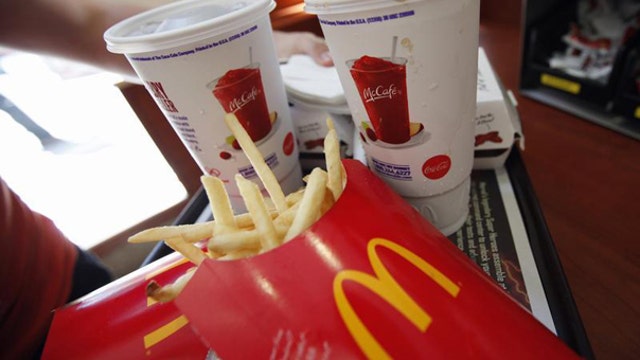Would Taxing High-Calorie Foods Curb Obesity?
Uncle Sam could make a healthy profit off of Americans’ bad eating habits and at the same time, improve the nation’s obesity rates, according to new research proposing taxing fatty foods.
The National Bureau of Economic Research finds that raising the price of a calorie for home consumption by 10% may lower the percentage of body fat in youths by nearly the same amount (8% or 9%). The research focused on youths and found that raising the prices of high-calorie fatty foods at fast-food chains would help reduce obesity rates, however, the tax could also have consumers skip healthy foods with higher calorie counts.
The nation’s growing waistline has become a top concern among lawmakers and experts, but not everyone agrees that the government should get involved in solving the problem.
Devon Herrick, senior fellow at the National Center for Policy Analysis, says a 8% -9% drop in body fat percentages among youths would be substantial, but adds parents might be more effective in eliciting eating habit changes that the government.
Indeed, the study says, “Taxes are blunt instruments that impose significant welfare costs on individuals who consume food in moderation. Moreover, in the case of adolescents, an additional issue is that parents may more easily and immediately affect the choices made by their children than the government.”
“For kids, parents can impact [fat loss] more easily than a tax,” Herrick says. “If you are worried about childhood obesity, parents are the first line of defense.”
Increasing the price of food may decrease calorie consumption, he says, but Americans would need a significant hike in prices to see major fat loss. And like most taxes, there’s always a loophole: Herrick points out raising rates of high-calorie options at fast food restaurants, as the study did, leaves out the dollar menu, and lower-priced options of equally-fatty foods.
“I can still choose from the dollar menu, which negates any impact of throwing the tax in.”
Dr. Leena Khaitan, director or the Bariatric Surgery Program at University Hospitals Case Medical Center, agrees with Herrick’s notion that parents should be policing their children before the government. However, Khaitan says she would prefer to see the prices of healthier foods lowered, rather than a tax placed on high-calorie items.
“From a public health standpoint, we did this [tax] with smoking and it made a huge impact in the country. But people still make choices to buy their food. If you want to get a salad, or shop at Whole Foods, versus fast food, you will always pay more for the healthy stuff. Even at a drive through, you still pay more for salads.”
Obesity, which was just deemed a disease by the American Medical Association in June, is the No.2 most common preventable death in America, after smoking, says Khaitan.
“We spend hundreds of billions a year [in America] on obesity from dieting to time off work, to hospital visits. It impacts society in huge ways,” she says. “From a business standpoint, [taxes] seems like a reasonable concept and a nice way to offset costs. But ethically, or morally, I feel uneasy about it.”
Also, the government subsidizes calories a great deal through the Supplemental Nutrition Assistance Program, Herrick says.
“If calories are the problem, we go through a lot of effort to subsidize them via public policy,” he says. “That doesn’t make a lot of sense.”
In addition, corn prices have shot up in recent years due to both droughts and ethanol production, Herrick says. The ripple effect of this is that other grains have also increased in price, as have costs associated with livestock production.
“If obesity were highly sensitive to food prices, there should have been a noticeable dip in obesity rates as food and energy prices rose in the past several years. I have not seen evidence of any such dip in obesity rates,” he says.




















